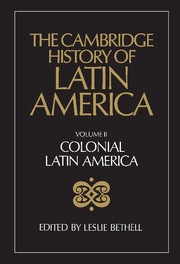Book contents
- Frontmatter
- PART ONE POPULATION
- PART TWO ECONOMIC AND SOCIAL STRUCTURES: SPANISH AMERICA
- PART THREE ECONOMIC AND SOCIAL STRUCTURES: BRAZIL
- PART FOUR INTELLECTUAL AND CULTURAL LIFE
- 16 Literature and intellectual life in colonial Spanish America
- A note on literature and intellectual life in colonial Brazil
- 17 The architecture and art of colonial Spanish America
- 18 The architecture and art of colonial Brazil
- 19 The music of colonial Spanish America
- Bibliographical essays
A note on literature and intellectual life in colonial Brazil
from 16 - Literature and intellectual life in colonial Spanish America
Published online by Cambridge University Press: 28 March 2008
- Frontmatter
- PART ONE POPULATION
- PART TWO ECONOMIC AND SOCIAL STRUCTURES: SPANISH AMERICA
- PART THREE ECONOMIC AND SOCIAL STRUCTURES: BRAZIL
- PART FOUR INTELLECTUAL AND CULTURAL LIFE
- 16 Literature and intellectual life in colonial Spanish America
- A note on literature and intellectual life in colonial Brazil
- 17 The architecture and art of colonial Spanish America
- 18 The architecture and art of colonial Brazil
- 19 The music of colonial Spanish America
- Bibliographical essays
Summary
The first account of Brazil dates from Cabral's landfall on the coast of South America in 1500: the letter of Pero Vaz de Caminha to Dom Manuel I, 1 May 1500 (in William Brooks Greenlee (ed.), The voyages of Pedro Alvares Cabral to Brazil and India from contemporary documents and narratives (Hakluyt Society, London, 1937)). The three most important sixteenth-century chronicles are, first, Pero de Magalhāes de Gandavo, Tratado da terra do Brasil and Historia da Provincia da Santa Cruz (Lisbon, 1576; Eng. trans., John B. Stetson, Junior, The histories of Brazil (2. vols., Cortes Society, New York, 1922)); secondly, Fernao Cardim S.J., Do clima e terra do Brasil and Do principio e origem dos indios do Brasil [c. 15 84], published as ‘A treatise of Brasil’ in Samuel Purchas, Hakluytus Posthumus, or Purchas His Pilgrimes (4 vols., London, 1625; 20 vols., Glasgow, 1905–7), and Tratados da terra egente do Brasil, ed. Capistrano de Abreu (Rio de Janeiro, 1925); thirdly, and most important of all, Gabriel Soares de Sousa, Tratado descritivo do Brasil em 1587 (first published Rio de Janeiro, 1851; Sao Paulo, 1938). Especially interesting and valuable are the letters and reports of the Jesuits who arrived with the founders of royal government in 1549. Most notable are the writings of Manoel de Nóbrega (during the period 1549–70) and José de Anchieta (during the period 1554–94). There are a number of collections of Jesuit letters. See, in particular, Serafim Leite, Monumenta Brasiliae (4 vols., Rome, 1956–60).
- Type
- Chapter
- Information
- The Cambridge History of Latin America , pp. 705 - 708Publisher: Cambridge University PressPrint publication year: 1984

